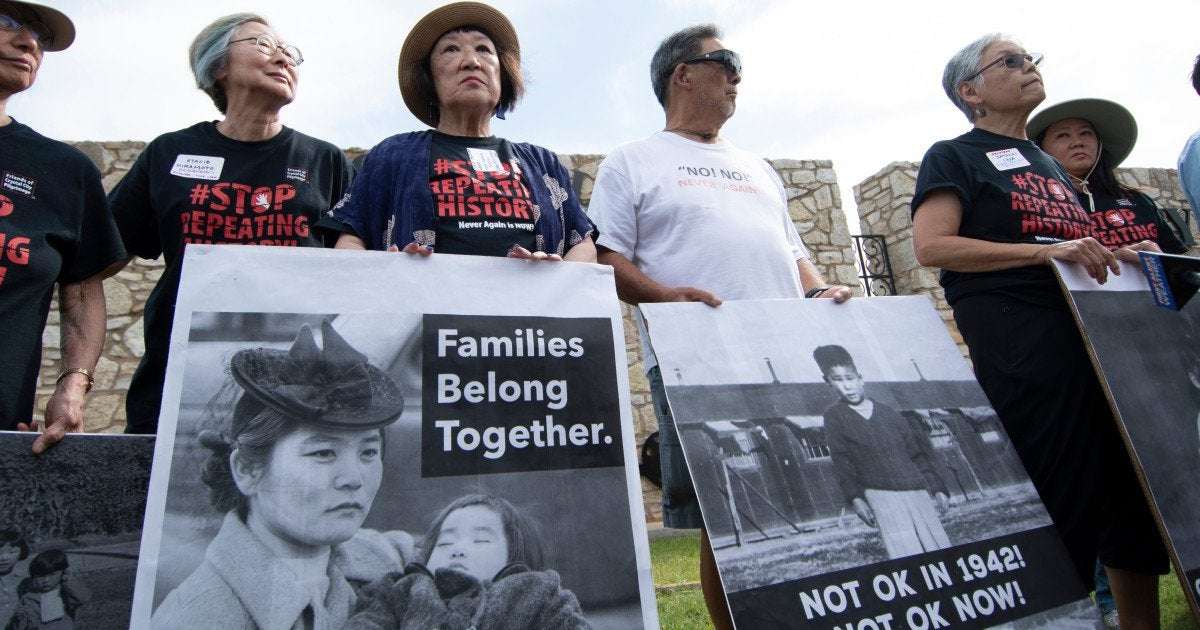Welcome to Recharge, a weekly newsletter full of stories that will energize your inner hellraiser. See more editions and sign up here.
They too were children when they were rounded up and incarcerated in an “internment” camp on US soil.
In their 70s and 80s now, a group of former Japanese American detainees rallied outside a military base in Oklahoma on June 22, urging US officials not to repeat America’s shameful history of forcing children behind bars and fences.
“We need to be the allies for vulnerable communities today that Japanese Americans didn’t have in 1942,” Seattle-based historian Tom Ikeda told the Los Angeles Times. Ikeda joined about two dozen of the World War II detainees and their descendants outside Fort Sill.
“We are here today to protest the repetition of history,” said Satsuki Ina, 75, of San Francisco, among 120,000 Japanese Americans imprisoned during World War II for their background.
It’s not easy to stand up for others and risk arrest. These protesters, many elderly, were met by uniformed military police, one of whom shouted, “You need to move right now! What don’t you understand? It’s English: Get out.”
The elderly protesters stood their ground.
Here are more Recharge stories to get you through the week:
A pantry for others. Think of a Little Free Library, a wooden set of shelves from which neighbors can share books. Now think of a similar outside box with canned goods to help less-fortunate neighbors. That’s the idea behind Little Free Pantries. More than 600 have sprouted up across the United States in the past three years, and they’ve appeared in Canada, the Netherlands, and New Zealand as well. “Addressing food insecurity takes a lot, and this is another pretty innovative piece to the puzzle that meets a really local need where it exists,” says Tim McDermott of the Virginia-based nonprofit Feed More, which gathers, prepares, and distributes food. ( Washington Post )
Beating a payday lender. For eight years, Maria Dichter, 73, has had to borrow $500 every month from a payday lender. On Social Security, she can make the monthly $54 interest and fee, but has to take out a new loan each time. She and her ailing husband have had to scrimp on food, limiting themselves to eggs and Special K cereal, to make the interest payments—until last month, when the WNYC/ ProPublica podcast Trump Inc. reported on her struggle in a story about the payday lending industry and the Trump administration. A listener paid off the loan in late June, and lawmakers are seeking to make sure the industry doesn’t lend to people without the means to repay. Listen to her story here: ( Trump Inc. )
How to be happy . A recent study suggests that living near a cafe or a library may help build trust, decrease loneliness, and create a stronger sense of community. Whether in big cities, small towns, or rural areas, people near such amenities, or parks, gyms, restaurants, or theaters, are more likely to say people in their community are “very willing” to help their neighbors, according to the study. “Communities that blend a healthy mix of amenities, such as schools, community centers, and grocery stores, improve our social well-being in ways that our arguments over politics never will,” say study authors Daniel Cox and Ryan Streeter. ( The Atlantic )
Saving the Earth. Thanks to everyone who wrote in with ideas on how to make a difference fighting climate change. Even if we don’t have millions of dollars in guitars to sell , like Pink Floyd’s David Gilmour, reader Jessica Lavish suggests starting with individual efforts, from reusable bags at the grocery store to backing planet-friendly politicians. Many of the thousands of people who shared this story on social media applauded Gilmour, with Sonja Rhae writing: “Pink Floyd still runs strong in this house and we support your cause. I do what I can on my end because we need to lead by example and you are [a] leader of the most gracious sort.” Mother Jones)
Many thanks to Recharge readers for spotting that a flower misidentified by the Interior Department in a photo in last week’s Recharge is actually known as dame’s rocket, not a phlox. The difference: A phlox has five petals; dame’s rocket has four.
I’ll leave you with this image from the Fisher Towers Recreation Site in Utah, courtesy of the Interior Department’s Twitter feed. Have a great week ahead!

DJTHatesPuertoRicans on July 3rd, 2019 at 13:28 UTC »
So does Chief Justice John Roberts. In Trump v Hawaii he went out of his way to call Japanese internment camps "concentration camps."
YOLO_HASHTAG_SWAG on July 3rd, 2019 at 13:23 UTC »
What do they know? Sean Hannity is the real expert since he was almost waterboarded once
itsacalamity on July 3rd, 2019 at 13:10 UTC »
Reading George Takei's essay on it hit me like a punch in the gut.
" ... And yet, with hideous irony, I can still say, “At least during the internment …”
At least during the internment, when I was just 5 years old, I was not taken from my parents.
My family was sent to a racetrack for several weeks to live in a horse stall, but at least we had each other. At least during the internment, my parents were able to place themselves between the horror of what we were facing and my own childish understanding of our circumstances. They told us we were “going on a vacation to live with the horsies.” And when we got to Rohwer camp, they again put themselves between us and the horror, so that we would never fully appreciate the grim reality of the mosquito-infested swamp into which we had been thrown. At least during the internment, we remained a family, and I credit that alone for keeping the scars of our unjust imprisonment from deepening on my soul. "